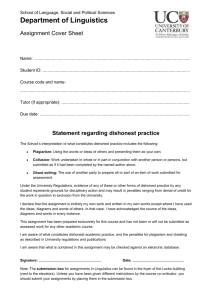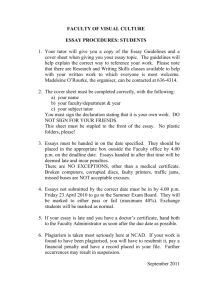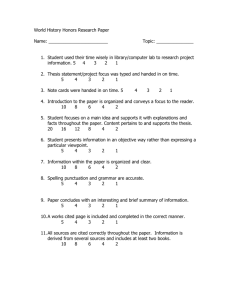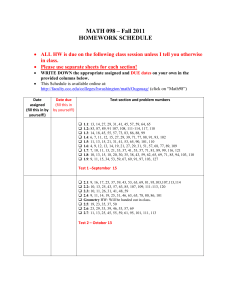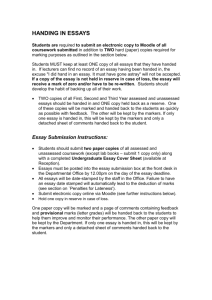CANTERBURY LL - School of Law
advertisement
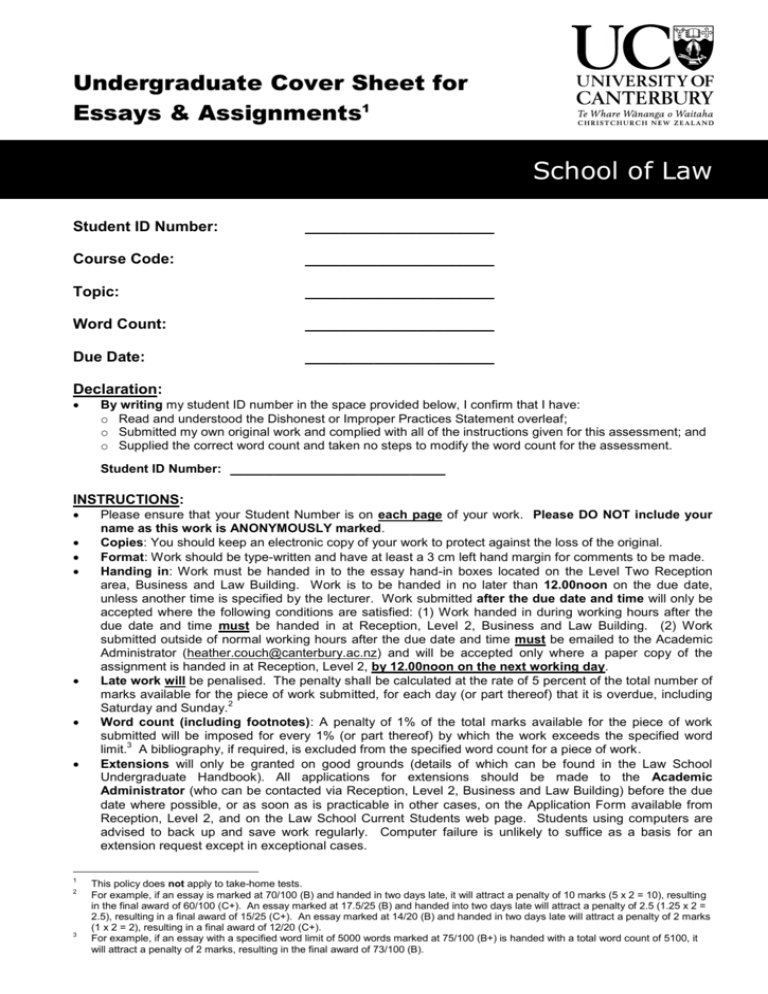
Undergraduate Cover Sheet for Essays & Assignments1 School of Law Student ID Number: ______________________ Course Code: ______________________ Topic: ______________________ Word Count: ______________________ Due Date: ______________________ Declaration: By writing my student ID number in the space provided below, I confirm that I have: o Read and understood the Dishonest or Improper Practices Statement overleaf; o Submitted my own original work and complied with all of the instructions given for this assessment; and o Supplied the correct word count and taken no steps to modify the word count for the assessment. Student ID Number: _________________________ INSTRUCTIONS: 1 2 3 Please ensure that your Student Number is on each page of your work. Please DO NOT include your name as this work is ANONYMOUSLY marked. Copies: You should keep an electronic copy of your work to protect against the loss of the original. Format: Work should be type-written and have at least a 3 cm left hand margin for comments to be made. Handing in: Work must be handed in to the essay hand-in boxes located on the Level Two Reception area, Business and Law Building. Work is to be handed in no later than 12.00noon on the due date, unless another time is specified by the lecturer. Work submitted after the due date and time will only be accepted where the following conditions are satisfied: (1) Work handed in during working hours after the due date and time must be handed in at Reception, Level 2, Business and Law Building. (2) Work submitted outside of normal working hours after the due date and time must be emailed to the Academic Administrator (heather.couch@canterbury.ac.nz) and will be accepted only where a paper copy of the assignment is handed in at Reception, Level 2, by 12.00noon on the next working day. Late work will be penalised. The penalty shall be calculated at the rate of 5 percent of the total number of marks available for the piece of work submitted, for each day (or part thereof) that it is overdue, including 2 Saturday and Sunday. Word count (including footnotes): A penalty of 1% of the total marks available for the piece of work submitted will be imposed for every 1% (or part thereof) by which the work exceeds the specified word 3 limit. A bibliography, if required, is excluded from the specified word count for a piece of work. Extensions will only be granted on good grounds (details of which can be found in the Law School Undergraduate Handbook). All applications for extensions should be made to the Academic Administrator (who can be contacted via Reception, Level 2, Business and Law Building) before the due date where possible, or as soon as is practicable in other cases, on the Application Form available from Reception, Level 2, and on the Law School Current Students web page. Students using computers are advised to back up and save work regularly. Computer failure is unlikely to suffice as a basis for an extension request except in exceptional cases. This policy does not apply to take-home tests. For example, if an essay is marked at 70/100 (B) and handed in two days late, it will attract a penalty of 10 marks (5 x 2 = 10), resulting in the final award of 60/100 (C+). An essay marked at 17.5/25 (B) and handed into two days late will attract a penalty of 2.5 (1.25 x 2 = 2.5), resulting in a final award of 15/25 (C+). An essay marked at 14/20 (B) and handed in two days late will attract a penalty of 2 marks (1 x 2 = 2), resulting in a final award of 12/20 (C+). For example, if an essay with a specified word limit of 5000 words marked at 75/100 (B+) is handed with a total word count of 5100, it will attract a penalty of 2 marks, resulting in the final award of 73/100 (B). Dishonest or Improper Practices It is recognised that students will discuss course work and assignments with others, and such discussion is an important part of the learning process. However, any work presented by a student for credit in a course must be that student’s own original work. If students are directed to complete work submitted for credit in groups, the work submitted must be the original work of the group. Work submitted in breach of these requirements or which fails to comply with other instructions contravenes the University’s Dishonest Practice and Breach of Instruction Regulations. Such work will either not be marked, and all credit for the work in question forfeited, or the matter will be referred to the University’s proctor for investigation and possible referral to the University’s Disciplinary Committee. Penalties which may be imposed in the event of a finding of dishonest or improper practice include loss of credit for a course or an item of assessment and, in serious cases, suspension or expulsion from the University. A record is kept of all instances of dishonest conduct. Students who are involved in any disciplinary matter also risk creating a situation in which the Dean of Law is unable to give a certificate of standing for the purposes of admission to the Law Society. Instances of dishonest or improper practice in coursework and assignments include but are not limited to: • Plagiarism. Plagiarism means the dishonest presentation of work that has been produced by someone else as if it is one’s own. Please note that the presentation of someone else’s work as one’s own, even without dishonest intent, may still constitute poor academic practice, and this may be reflected in the mark awarded. There are academic conventions governing appropriate ways to acknowledge the work or part of the work of another person and these are set out in the New Zealand Law Style Guide. • Submitting for credit in a course an essay or research paper which, although it is the student’s own work, is substantially the same as work which has already been (or will be) submitted for credit in another course, whether in the School of Law or some other department or academic institution. • Copying the work of another student. This includes copying the work submitted by another student for credit for a course in the School of Law or some other department or academic institution. • Knowingly allowing another student to copy work which that other student then submits for credit for a course in the School of Law. • Arranging for another person to complete work which is then submitted for credit for a course in the School of Law. An example falling in this category is work submitted for credit which has been obtained from a commercial assignment completion service. Care must be taken when using editing services as it is only assistance with grammar, punctuation and expression that is permissible. • Completing work for another student which is then submitted by that other student for credit for a course in the School of Law. • Including made up or fabricated material in work submitted for credit for a course in the School of Law. • Collaborating in the preparation of answers for take home tests unless advised otherwise in the take home test instructions. If you are in doubt about any of the above with respect to a particular course, you should discuss the matter with the lecturer concerned. See also the University Discipline Regulations, Dishonest Practice and Breach of Instructions Regulation, and Academic Integrity Policy – refer to UC Calendar and UC web.
